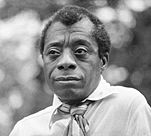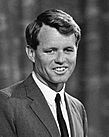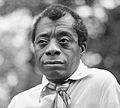Baldwin–Kennedy meeting facts for kids
The Baldwin–Kennedy meeting happened on May 24, 1963. It was an important effort to make race relations better in the United States. Robert F. Kennedy, who was the Attorney General (the country's top lawyer), invited famous writer James Baldwin. He also invited many other important cultural leaders. They met in a Kennedy family apartment in New York City.
The meeting became very tense. The group did not agree on solutions. The Black leaders felt that Kennedy did not fully understand the serious problem of racism in America. However, the meeting showed how urgent the racial situation was. It became a positive turning point in Kennedy's views on the Civil Rights Movement.
Why the Meeting Happened
After slavery was officially ended, the United States still had a society with a lot of racism. This was enforced by Jim Crow laws and other unfair systems. This racism became very clear because of many public events. These included police violence against peaceful protests, known as nonviolent direct actions.
The Birmingham campaign and the Birmingham riot of 1963 brought a lot of negative attention to racism in American cities. Robert Kennedy wanted to stop similar problems from happening in northern cities. James Baldwin was already talking with Kennedy about the Birmingham events. He asked for an investigation into how federal agencies like the FBI were involved.
Baldwin was a very popular writer. He had recently become even more famous because of his book, The Fire Next Time. This book had two essays that called for action against racism. Baldwin had become an important Black American voice. Kennedy wanted his advice on how to improve race relations. Kennedy had met Baldwin before, at a Nobel Prize dinner in 1962. They also met briefly in May 1963. They agreed to meet again with a group of cultural leaders that Baldwin would bring together.
The Meeting Itself
Clarence B. Jones, an advisor to Martin Luther King Jr. and a participant, said that in May 1963, Robert Kennedy asked James Baldwin to arrange a "quiet, off-the-record" meeting. This meeting was meant for important Black leaders to discuss race relations. It took place at a Kennedy family apartment at 24 Central Park South in New York City.
To meet with Kennedy and his aide Burke Marshall, Baldwin brought several people:
- David Baldwin, James Baldwin's brother
- Harry Belafonte, a singer and activist
- Edwin C. Berry, director of the Chicago Urban League
- Kenneth Clark, a psychologist and activist
- June Shagaloff Alexander, Education Director of the NAACP
- Lorraine Hansberry, a playwright famous for A Raisin in the Sun
- Lena Horne, a musician, actor, and activist
- Clarence B. Jones, a civil rights lawyer and advisor to Martin Luther King Jr.
- Jerome Smith, a Freedom Rider from the Congress of Racial Equality (CORE)
- Rip Torn, a young white actor
Jerome Smith was a young Black civil rights worker. He had been beaten and jailed in Mississippi. Edwin Berry brought him to the meeting. Robert Kennedy and most of the others did not know Smith's story. As the meeting began, Kennedy started talking about how the Justice Department had supported the civil rights movement. Suddenly, Smith began to cry. He said, "I've seen you guys [the Justice Department] stand around and do nothing more than take notes while we're being beaten." The mood in the room quickly became very tense.
Baldwin later explained that Smith "set the tone of the meeting." He said Smith stammered when he was upset. Smith told Bobby (Robert Kennedy) that he felt sick just being in the room. Baldwin knew it wasn't personal. But Bobby took it personally and turned away from Smith. Baldwin said this was a mistake. Kennedy then turned to the others, who were seen as the "reasonable" representatives. Lorraine Hansberry then said, "You've got a great many very, very accomplished people in this room, Mr. Attorney General. But the only man who should be listened to is that man over there."
Kennedy and Smith began to argue. Kennedy was very surprised when Smith said he would "never never never" join the military to fight for the USA. The group generally felt that Kennedy did not understand how deep the problem of racism was.
Harry Belafonte recalled that Smith "bared his soul and all his pain." Smith then said aggressively, "Let me tell you something, in the midst of our oppression you expect to find us giddily going off to fight a war (like the Vietnam War) that's your war, that's unjust, unfair, and so dishonorable it should shame you. I wouldn't pick up a gun to fight for this country. I'd die first."
Hansberry told Kennedy, "Look, if you can't understand what this young man is saying, then we are without any hope at all." She added that if Kennedy, as a representative of "the best that a White America can offer," was insensitive, then there was "no alternative except our going in the streets ... and chaos." Jerome Smith also told Kennedy, "I'm close to the moment where I'm ready to take up a gun."
Kennedy said that his family, who were immigrants from Ireland, had faced discrimination. But they overcame it to achieve political success. He suggested that the U.S. might have a Black president in 40 years. David Baldwin pointed out that his family had been in the country much longer than Kennedy's. Yet, they had barely been able to escape poverty. Kennedy later said, "They seemed possessed. They reacted as a unit. It was impossible to make contact with any of them."
The meeting ended after about two and a half or three hours. Hansberry walked out, and most of the others followed her.
Even though the meeting was supposed to be private, details came out a few weeks later. The New York Times published an article by James Reston. It described the Kennedy administration's approach to race relations. Reston's summary only gave Robert Kennedy's view. He said the problem was with "militant Negro and white leaders." He also stated that the attorney general "apparently has little faith in the quieter moderate leaders of both races."
Clarence Jones, who was Martin Luther King Jr.'s lawyer at the meeting, strongly disagreed with Reston's story. He sent a detailed, four-page letter to the New York Times editor. He also sent a copy to Robert Kennedy. Jones gave his own view of the meeting. He challenged the idea that he, as a lawyer for Dr. King, had stayed silent. Jones listed four areas where he had actively talked with the Attorney General during the meeting.
Jones said he had asked the President to personally go with University of Alabama students. This would help make sure integration was successful. He also brought up the appointment of certain judges by Kennedy's administration. Jones felt these judges had openly shown their support for segregation before being appointed. He suggested the President give televised speeches about ending segregation and discrimination. Finally, he discussed the role of some white Southern FBI agents in civil rights cases.
What Happened Next
After the meeting, Baldwin and Clark went to WGBH-TV. Clark interviewed Baldwin on tape. Baldwin said, "We were a little shocked at the extent of his naivete." He added that while the Kennedy administration had done some things the Eisenhower administration never did, its actions had not yet helped most Black people.
After the meeting, Robert Kennedy told FBI director J. Edgar Hoover to watch Baldwin more closely. He also ordered the tapping of Jones's home phone. A memo sent four days later asked the FBI to find "derogatory" information about Baldwin. A later report called Baldwin a "communist." Actor Rip Torn also found out he was being watched after the meeting. Baldwin also said he faced problems from the State Department, including issues with his passport.
Harry Belafonte remembered Martin Luther King Jr. calling him the next day. King wanted to know about the meeting. When Belafonte described it as a "disaster" and mentioned Jerome Smith's "fighting words," King said, "Maybe it's just what Bobby needed to hear."
Clarence Jones recalled Martin Luther King Jr. saying to him, "Looks like the Attorney General of the United States regards you as an uppity Negro. But that's all right. We still love you. You're our uppity Negro."
To his biographer, Arthur Schlesinger, Kennedy said, "They don't know what the laws are—they don't know what the facts are—they don't know what we've been doing or what we're trying to do. You can't talk to them the way you can talk to Martin Luther King or Roy Wilkins. They didn't want to talk that way. It was all emotion, hysteria—they stood up and orated—they cursed—some of them wept and left the room."
Despite the tension, Schlesinger and others see this meeting as a major turning point for Robert Kennedy. It changed his attitude towards the Black liberation struggle. Less than one month later, President Kennedy gave his important Civil Rights Address. Robert Kennedy was the only White House advisor who strongly encouraged his brother to give this speech. In the speech, the president publicly suggested new laws that would become the Civil Rights Act of 1964. Robert Kennedy later asked the Senate Judiciary Committee, "How long can we say to a Negro in Jackson, 'When war comes you will be an American citizen, but in the meantime you're a citizen of Mississippi—and we can't help you'?"
Images for kids
 | William L. Dawson |
 | W. E. B. Du Bois |
 | Harry Belafonte |





